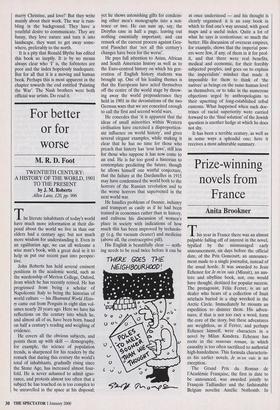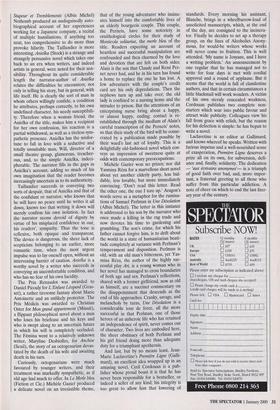Prize-winning novels from France
Anita Brookner
his year in France there was an almost palpable falling off of interest in the novel, typified by the mismanaged early announcement, six days before the official date, of the Prix Goncourt, an announce- ment made to a single journalist, instead of the usual horde. It was awarded to Jean Echenoz for Je m'en vais (Minuit), an aus- tere and sibylline book, not, one would have thought, destined for popular success. The protagonist, Felix Ferrer, is an art dealer who hears of a collection of Inuit artefacts buried in a ship wrecked in the Arctic Circle. Immediately he mounts an expedition to disinter them. His adven- tures, if that is not too racy a word, form the core of the story, but these adventures are weightless, as if Ferrer, and perhaps Echenoz himself, were characters in a novel by Milan Kundera. Echenoz has roots in the nouveau roman, in which causality is too often sacrificed to authorial high-handedness. This formula characteris- es his earlier novels. Je m'en vais is no exception.
The Grand Prix du Roman de l'Academie Francaise, the first in date to be announced, was awarded jointly to Francois Taillandier and the fashionable Belgian novelist Amelie Nothomb. In Stupeur et Tremblements (Albin Michel) Nothomb produced an undisguisedly auto- biographical account of her experiences working for a Japanese company, a recital of multiple humiliations, if anything too neat, too comprehensive to do more than provoke hilarity. The Taillandier is more interesting. Anielka (Stock) is a strange and strangely persuasive novel which takes one back to an era when writers, and indeed artists in general, were noted for their sen- sibility. Throughout its quite considerable length the narrator-author of Anielka relates the difficulties he encounters, not only in telling his story, but in general, with life itself. He is clearly the sort of man in whom others willingly confide, a condition he attributes, perhaps correctly, to his own undefined character, his needy susceptibili- ty. Therefore when a woman friend, the Anielka of the title, makes him a recipient for her own confession, his reaction is a partial withdrawal, as well as a tireless sym- pathetic presence. Anielka has the misfor- tune to fall in love with a seductive and totally unsuitable man, Will, director of a small theatre group, glamorous, treacher- ous, and, to the simple Anielka, indeci- pherable. The narrator fills in the gaps in Anielka's account, adding so much of his own imagination that the reader becomes increasingly uncertain as to its authenticity.
Taillandier succeeds in conveying two sorts of despair, that of Anielka and that of the confidant or narrator, who knows that he will have no peace until he writes it all down, knows too that writing it down will merely confirm his own isolation. In fact the narrator seems devoid of dignity by virtue of his misplaced confidence in our, his readers', sympathy. Thus the tone is reflexive, both opaque and transparent. The device is dangerous, the sheer lack of scepticism belonging to an earlier, more romantic time, when the most urgent impulse was to lay oneself open, without an intervening barrier of caution. Anielka is a worthy novel by a writer who succeeds in conveying an uncomfortable condition, and who has no fear of his own lucidity.
The Prix Renaudot was awarded to Daniel Picouly for L'Enfant Leopard (Gras- set), a rather tiresome fantasy about Mane Antoinette and an unlikely protector. The Prix Medicis was awarded to Christian Oster for Mon grand appartement (Minuit), a flippant philosophical novel about a man who loses his briefcase and his keys and who is swept along to an uncertain future in which his will is completely occluded. The Femina went to a relatively unknown writer, Maryline Desbiolles, for Anchise (Seuil), the story of an octogenarian devas- tated by the death of his wife and awaiting death in his turn.
Curiously, octogenarians were much favoured by younger writers, and their treatment was markedly sympathetic, as if old age had much to offer. In Le Merle bleu (Fiction et Cie.) Michele Gazier produced a delicate novel on an irresistible theme, that of the young adventurer who insinu- ates himself into the comfortable lives of an elderly bourgeois couple. This couple, the Pernets, have some notoriety in ornithological circles for their study of Monticola solitarius, the merle bleu of the title. Readers expecting an account of heartless and successful manipulation are confounded and then charmed by the love and devotion that are felt on both sides: Main is the son that Claude and Rene Per- net never had, and he in his turn has found a home to replace the one he has lost. A few adventures with the couple's credit card are his only depredations. Then the nephews turn up and take over; the old lady is confined to a nursing home and the intruder to prison. But the attentions of an enterprising nurse bring about a happy, or almost happy, ending: contact is re- established through the medium of Alain's careful transcription of the Pernets' notes, so that their study of the bird will be conse- crated by a publication made possible by their ward's last act of loyalty. This is a delightfully old-fashioned novel which con- veys an impression of sweetness quite at odds with contemporary preoccupations.
Michele Gazier won no prizes; nor did Yasmina Reza for a marvellous short novel about yet another elderly party, less bid- dable, less lovable, but more immediately convincing. 'Don't read this letter. Read the other one, the one I tore up.' Aragon's words serve as a metaphor for the rumina- tions of Samuel Perlman in Une Desolation (Albin Michel). The letter in this instance is addressed to his son by the narrator who once made a killing in the rag trade and now devotes his time to gardening and grumbling. The son's crime, for which his father cannot forgive him, is to drift about the world in a state of humanitarian beati- tude completely at variance with Perlman's temperament and disposition. Perlman is old, with an old man's bitterness, yet Yas- mina Reza, the author of the highly suc- cessful play Art, is a young woman who in her novel has managed to cross boundaries of both age and sex. Perlman's reflections, shared with a former girlfriend, now as old as himself, are a succinct commentary on the disappointment that descends as the end of life approaches. Cranky, savage, and melancholy by turns, Une Desolation is a considerable tour de force, all the more successful in that Perlman, one of those heroes of an unheroic life who has retained an independence of spirit, never comes out of character. Two lives are embodied here, the sheer obstinacy of both Perlman and his girl friend doing more than adequate duty for a triumphant apotheosis. And last, but by no means least, Jean- Marie Laclavetine's Premiere Ligne (Galli- mard), an excellent idea wrapped up in an amusing novel. Cyril Cordouan is a pub- lisher whose proud boast it is that he has never been responsible for a bestseller, or indeed a seller of any kind; his integrity is too great to allow him that lowering of standards. Every morning his assistant, Blanche, brings in a wheelbarrow-load of unsolicited manuscripts, which, at the end of the day, are consigned to the incinera- tor. Finally he decides to set up a therapy group, on the lines of Alcoholics Anony- mous, for would-be writers whose works will never come to fruition. This is well attended. 'My name is Josyane, and I have a writing problem.' An announcement by one regular that he has managed not to write for four days is met with cordial approval and a round of applause. But it seems that the world is full of clandestine authors, and that in certain circumstances a little blackmail will work wonders. A victim of his own sternly concealed weakness, Cordouan publishes two complete non- starters which soar into public favour and attract wide publicity. Colleagues view his fall from grace with relish, but the reason for his defection is simple: he has begun to write a novel.
Laclavetine is an editor at Gallimard, and knows whereof he speaks. Written with furious impetus and a well-nourished sense of exasperation, Premiere Ligne deserves a prize all on its own, for subversion, defi- ance and, finally, solidarity. The dedication — 'aux ecrivains anonymes'— is a triumph of good faith over bad, and, more impor- tant, a fraternal greeting to all those who suffer from this particular addiction. A note of cheer on which to end the last liter- ary year of the century.



















































 Previous page
Previous page